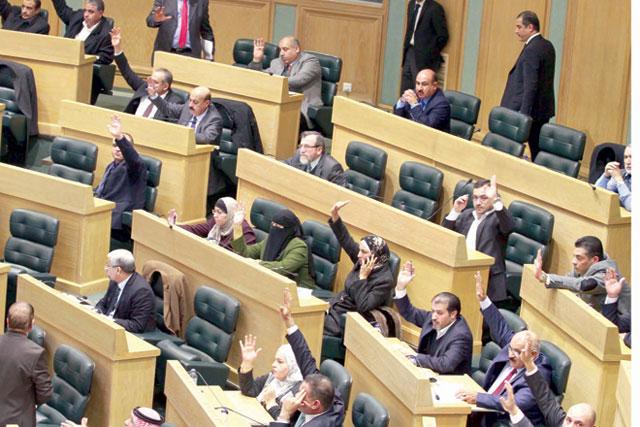You are here
‘Amendments to Penal Code seek to address new crimes, bolster rule of law’
By Dana Al Emam - Jun 09,2015 - Last updated at Jun 09,2015

Justice Minister Bassam Talhouni speaks to reporters in Amman on Tuesday (Petra photo)
AMMAN — The draft amendments to the Penal Code set the stage for a “stricter” rule of law and address the emergence of new types of crimes, Justice Minister Bassam Talhouni said Tuesday.
The bill, which includes 170 articles that are either new or amended, is currently under study at the Legislation and Opinion Bureau at the Prime Ministry.
“Since the Penal Code was passed in 1960 it has undergone 23 partial amendments, but this is the most comprehensive of all,” Talhouni said at a meeting with the press, adding that the draft introduces “alternative punishments” for the first time, such as community service.
The bill, he noted, proposes punishments for new types of crimes that were not as common in the past, including blackmail, protection rackets and car theft.
It also introduces punitive measures to curb sexual harassment, campus violence, violations on water resources, festive firing and assaults on public employees.
Talhouni said the draft law is still in its “primary phases” and is subject to changes through the legal process, which include the Legislation and Opinion Bureau, the Lower House and the Senate.
The draft amendments were introduced while taking into consideration the opinions of all stakeholders and concerned civil society organisations, according to Judge Yaseen Abdallat, head of the ministry’s committee which worked on the bill for around a year.
He said the amendments are in line with international agreements that Jordan has signed.
Providing further elaboration, Hassan Tarawneh, a professor of law at the University of Jordan and a member of the committee, said the amended legislation changes some of the terminology used in order to correspond with international penal codes.
One example is omitting the word “hard” from the phrase “hard labour”, Tarawneh said, while the life sentence was reduced to 30 years.
He added that the article on community service seeks to prevent those involved in “simple” offences, such as car accidents, from entering correctional and rehabilitation centres, which are already crowded with perpetrators of serious crimes.
The draft also provides more detailed definitions of concepts like sexual harassment, according to the professor.
The bill embodies an adaption to local and regional developments, said Judge Nasser Salamat, the attorney general’s assistant, adding that some penalties in the current Penal Code are “not suitable for the crimes”.
He explained that any attempt to cross the Kingdom’s borders illegally is considered a felony with a maximum penalty of one week in prison, while the current regional situation dictates a “stricter” punishment.
The same applies to violations on water pipes and networks, as the Kingdom suffers from “severe” water shortage yet witnesses numerous cases of water theft, Salamat said.
The draft also stiffens penalties for crimes that threaten the national economy, such as currency fraud, Judge Hazim Majali noted.
Another point of debate is Article 183 that was included in the bill, under which workers in “vital sectors” will be imprisoned if they go on strike.
This article was a source of “extensive debate” among members of the committee, according to Issa Marazeeq, the National Centre for Human Rights representative in the committee, who said he abstained from voting on this provision.
However, Judge Nassar Halalmeh, another committee member, said the article bans “illegal” strikes that could affect work progress.
He added that the bill deals with several kinds of crimes that seek to “harm” society, such as banning those who commit economic crimes from opening a new company for five to seven years.
Another amendment punishes any person who publicises slogans that harm national unity in football matches.
Related Articles
AMMAN — The government has suggested introducing electronic bracelets for individuals convicted of minor offences, Justice Minister Ba
AMMAN — The Senate on Wednesday passed a draft law amending the Penal Code for the year 2017, without changes to the Lower House-made change
AMMAN — The Lower House on Monday endorsed the general pardon draft law granting full exemptions from fines, penalties and disciplinary meas

















